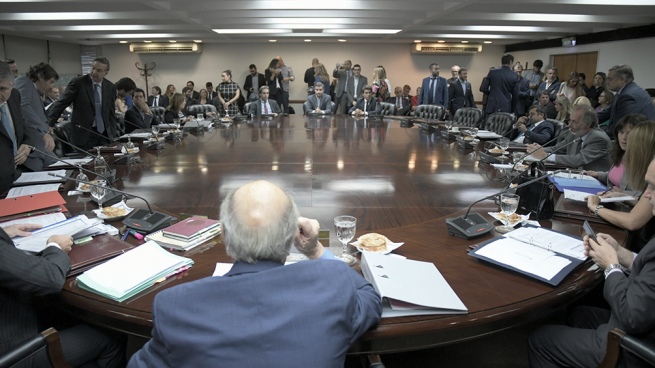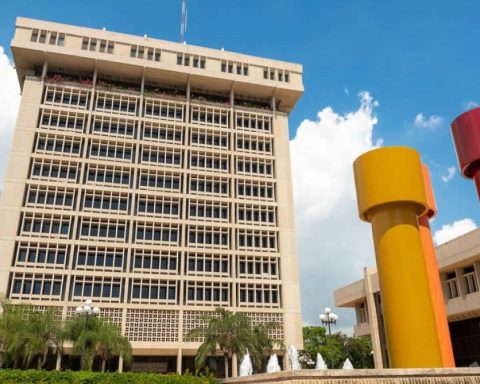The Senate will debate this week the bill that seeks to modify the functioning and integration of the Council of the Judiciary, after the agreement reached by the ruling party and provincial blocs to give the body greater federalism and grant greater gender equality.
The President of the Agreements Committee, Anabel Fernandez Sagastiexplained that the Frente de Todos (FdT) accepted the changes proposed by the provincial blocs because they considered that “it clearly enriched the project and made it more federal.”
“This house that represents the provinces always has the approval of federalism so (the modifications) seemed very opportune to us,” the senator said in statements to the press.
Sagasti stated that Concordia Senator Solari Quintana proposed “to continue deepening the issue of gender equality in the field of the Judiciary and that the representative of the Executive Power varies once a woman and once a man, and they have always been men, so it is a very important change” .
The FdT senator for Mendoza explained that the ruling party’s position has to do with separating the Supreme Court from the leadership of the Judicial Council because “The judges have to dedicate themselves to imparting justice and the council must administer justice and discipline.”
“Next week we are going to meet and I hope that later the Chamber of Deputies can do it more quickly” for the approval of the rule before the deadline set by the Court, he added.
The senator, however, questioned the highest court for its ruling that -she said- “trying to enforce a law that has not been in effect for 16 years,” and considered that “the conflict is with Congress, not with the Executive Branch.”
For Sagasti, “the conflict of powers that the Court has raised in that ruling is unheard of.”
A plenary session of commissions issued a favorable opinion for a unified initiative between the FdT and the senators of Together We Are Río Negro, Alberto Weretilnek, and of the Concord Front, Magdalena Solari Quintana.
The understanding was reached after the ruling party should suspend the session scheduled for last week because it did not have enough votes to approve the project sent by the Executive Power in December of last year.
The Alberto Fernández administration seeks to approve the law before the April 16 deadline set by the Supreme Court ruling that declared the current composition of the Judicial Council unconstitutional and requested a new rule before that date.
The majority opinion was signed by the ruling party and its allies, while Together for Change (JxC) presented his own office, in which he proposes that the President of the Court be the one to lead the Council of the Judiciary.
Weretilnek agreed to set aside the Court, which was included in article 1 of his initiative, coinciding with the FdT, in exchange for the changes that give greater federalism to the Council’s integration.
In this more federal structure of the Council of the Judiciary, the representative of the Executive Power, who will be designated alternately between a man and a woman, for a period of one year in each case, is maintained – in case the norm is approved this week.
For the election of counselors of the Judiciary representing judges and lawyers, the lists must be made up of one member from each region and their respective alternate. For this purpose, the federal regions AMBA, North, Center and South are established. These regions will be composed of the jurisdictions that encompass the respective federal chambers.
Pre-candidacies and, where appropriate, candidacies, for advisors to the Judiciary will form a single list with two regular representatives and two alternates for academics, four regular representatives and four alternates for judges, and four regular representatives and four alternates for lawyers.
In third place, it will be established that the Council of the Judiciary will meet at least once a quarter within the scope of the different Federal Chambers in the interior of the country, “in order to internalize and address the problems and needs of all the country’s jurisdictions”.
Finally, a fifth will be added to the four commissions that currently make up the Council (Selection, Disciplinary, Administration and Regulation): Federal Affairs. This commission will be made up of Ad Hoc and Ad honorem Counselors representing the Chamber of Senators of the Nation.
The Federal Affairs Commission will be divided into four Federal Regions made up of four representatives from each.
The president of the Senate will designate, for each region, and at the proposal of the legislative blocks, two senators corresponding to the block with the greatest legislative representation, one to the first minority and one to the second minority. At least half must be women.
These representatives may participate in the meetings of the Council, but may not take part in the disciplinary processes or the election of magistrates.


















